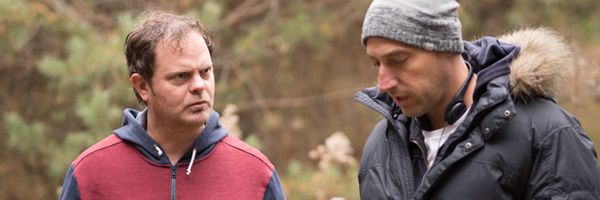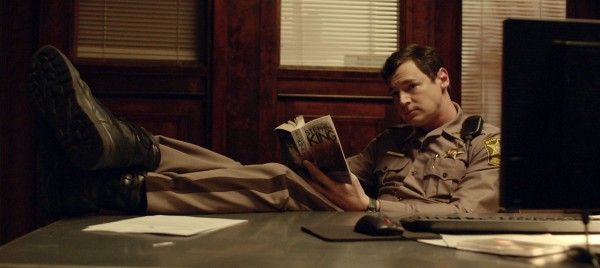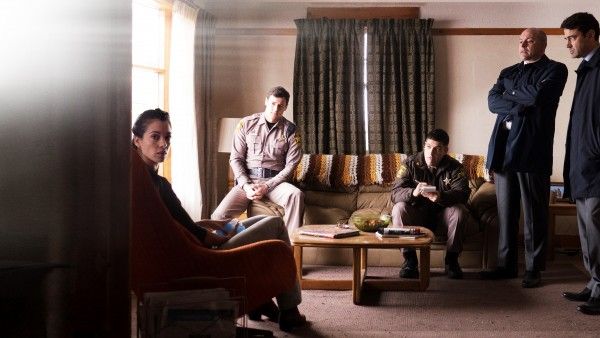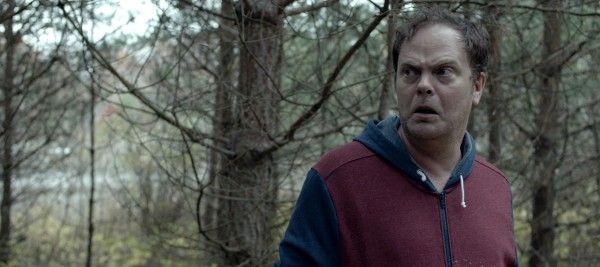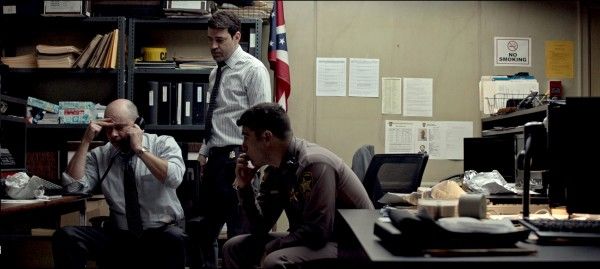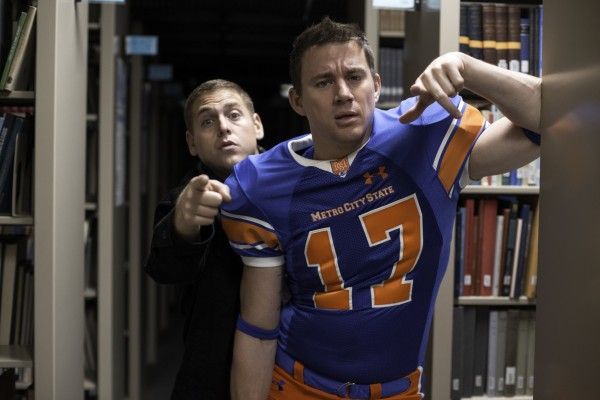Making a directorial debut is hard, but making one with a story told in reverse is a specific kind of challenge. Just ask filmmaker Oren Uziel, whose directorial debut Shimmer Lake hits Netflix on Friday, June 9th. The film is one of the first scripts Uziel ever wrote, before he’d go on to work on movies like 22 Jump Street and the upcoming Cloververse movie formerly known as God Particle, and it’s a crime story told in unique fashion.
The film stars Benjamin Walker as a local sheriff hunting down three bank robbery suspects, two of which are played by Rainn Wilson and Wyatt Russell. The story unfolds in reverse, beginning at the end, as the audience tries to put the pieces together for this crime that may be more than what it appears on the surface. Uziel fills the cast out with actors who have a solid comedic background like Adam Pally and Rob Corddry, and the result is a dark and moody drama that doesn’t feel overbearingly bleak. The performances are swell, and working with The Witch cinematographer Jarin Blaschke, Uziel carves out a foreboding aesthetic that adds to the tense atmosphere surrounding the story.
I recently got the chance to speak with Uziel for an exclusive interview about the film. We discussed the process of writing a movie told in reverse, the impetus behind casting actors with comedic backgrounds, the surprising origin story behind the film, and working with Netflix. Given that Uziel is also busy writing other notable screenplays, we also discussed how God Particle turned into a Cloverfield movie, his take on the Mortal Kombat reboot, looking back on the genius that is 22 Jump Street, and his yet-to-be-made script for a Men in Black reboot.
Check out the full interview below. Shimmer Lake will be available to stream on Netflix starting June 9th.
I hate to ask such a boring question at the beginning, but this idea to tell a crime story backwards is fascinating to me. I genuinely am curious, where did this idea first come about for Shimmer Lake?
OREN UZIEL: It's funny because I have this story ... I wrote the script eight years ago. I have referred to what the origin of it is a million times just in passing. I no longer know if it's true or not, but I do think it's true. I grew up watching HBO either at friends' houses or my parents finally got it when HBO was just a channel that showed movies. It was the only place that showed movies uninterrupted, without commercials, and with nudity and cursing and violence. I would watch anything. I remember that I would flick over to HBO and it didn't matter at what point of the movie it was on, I would just start watching. I have this memory of watching a lot of movies just completely out of order because I would watch something and then four days later I'd find it again and it would be half an hour earlier. I would say, "Oh! Oh shit, this happened before that other stuff. It's going to explain why that fat guy hates that other guy so much." I had no idea why he was so angry before. I found it really compelling. I realized that a lot of times when I finally watched that same movie from start to finish, it wasn't a particularly good movie, it was just that the tension and the thrill of trying to figure out what leads to the thing I'd already seen, while also trying to keep in my head what's happening right in front of me, was a really compelling way to tell a story. I thought if it works for that movie, why not construct a movie like that and be able to take advantage of that and laying set-ups and pay off as you go and take advantage of that structure. I really think that's where it came from.
That's really interesting. I hadn't thought about that, cause that's how I used to watch movies. Thinking about it now, it doesn't ... With DVR and on-demand and Netflix and everything, I don't know if anyone's watching movies like that anymore.
UZIEL: Definitely not. It's just not the experience. I watch things with my kids now, and they can't even ... If they can't watch something right now, they cannot understand that concept. If you're watching a TV show on network television. They've gotten into Survivor lately. Like, "Let's just watch!" "You can't watch. It's not a thing yet."
Yeah. If it's not on-demand yet, what's going on?
UZIEL: Yeah. I always thought it adds a component of active watching, if that makes sense. The goal was to, if you do it deliberately and you make sure the story you're telling is not one that would function forward, then it becomes more than just a gimmick. If you watch Shimmer Lake forward, it's not Memento where it would still be rewarding. You'd watch it forward, it's a movie with no surprises.
How did you go about writing the story? Did you plot the entire thing out forwards first and then write it backwards? Did you write it forwards and then restructure it?
UZIEL: I wrote it the way it is. I wrote the whole thing backwards. I never wrote it forwards and restructured it. I think it wouldn't have worked that way. For me, it was a matter of starting with an end point. I just knew ... The first thing that popped into my head was this notion of this guy with a bag of money, and he's tired, and you know he's been through a lot. A car pulls up, and there's someone that he knows is inside. Someone he's been waiting for and trusts. But what happens from that moment forward, they betray him, but not what he expects to happen. It just felt like, all right, if that's where I'm ending up, how did I get there? What is the story? I'm going to lead all those things to come to make sense. As an exercise, it was interesting. It's the first screenplay I wrote.
Oh, wow.
UZIEL: I think if I had written ... I would not write this screenplay now, because I know how difficult it would be. Back then, I was just too naive to know what the challenges were. I remember when if first started giving it to my trusted friends and readers, it very quickly was like, "Oh, this doesn't work. It's way too clear what's about to happen." Or, "This doesn't work. You didn't make it remotely clear enough. It's happening for no apparent reason." Or, "It's not following." It took a lot of rewriting and making sure everything adds up and everything is happening for a reason and not just coming out of left field. That's one of the biggest flaws with any movie in this genre, whether it's told straight or backwards. You have to make sure that when the things finally happen, they're not just happening because you want them to happen.
Yeah, yeah. The film its self is quite serious, although not without its moments of humor. The cast is full of comedic actors. I've met Ben Walker and he's hilarious. How did you go about casting this, and what was the impetus behind casting actors who had a comedic or improv background?
UZIEL: I would say it was more comedic than improv, so it was important to me. Some of it is happenstance through casting an indie movie, I will say that for sure. In making Jump Street and making Kitchen Sink, which became Freaks of Nature, I've been working in comedy. I think comedic actors are amazing. I think they are capable. When comedic actors play things straight, I think there's a certain pop to me that always hits me hard. I think that they have an ability that always blows me away. Ben Walker is, I won't say secretly, because he had some of the comedy show in New York. He seems very straight, but he's not. He's a very funny guy, as well. I think all these guys, it's fun for me to take Adam Pally and his impulses to go big and reign him in a little bit and get the genuine from him. I think he's amazing. Rainn can be ... You feel his pain so much more. I don't know, cause I think you're so used to seeing him being funny, it's like, "Well, no. This is real." It really had a lot of impact.
For sure. This is also your first movie as a director. The visual aesthetic is very cloudy and moody, reflecting the more somber and sinister actions of the characters. It really gives the film a sense of foreboding. Even though Adam Pally is funny, and I know that he's funny and he's cracking some jokes, I feel like something bad is going to happen. Obviously, you see some bad stuff happen at the beginning. As a first time director, how did you go about deciding how you wanted to tell the story visually?
UZIEL: A lot of it is a combination of things that we're talking about. What you’re saying is kind of music to my ears because I wanted to have that look and feel of foreboding. I think that can help you if your cast ... If you're just looking at your cast, you're gonna say, "Oh, this is a big, fat comedy." I think if you're going to cast a movie like that, you have to dispel that notion quickly or you're going to be confusing the audience, and subverting their expectations in a bad way. You always want to do that in a good way. I think with a movie like this, you have to be really careful about tone. You have to make sure it's consistent. To me, picking that visual style is about picking the tone that the movie really is going to live in. It is a move where bad things are going to happen and keep happening to these people. I think layering that level of gloom on top of it was a very specific choice and a helpful choice. Unquestionably a lot of that also comes from ... I chose to work with Jarin Blaschke, who had just done The Witch. I don’t know if you saw The Witch but that is…
Oh yeah, it’s incredible.
UZIEL: That's as scary and gloomy and creepy a feeling movie as you can get. Jarin is great and was a great partner in helping, through the lighting, to set that mood. Set that aesthetic feel to the whole film.
Yeah, I saw The Witch at Sundance and went off the logline. It was the first screening, and I didn't know it was a horror movie. I was just terrified out of my mind. I though it was this Colonial period drama, and I was blown away.
UZIEL: I think that's the best way to see that movie. I love it. It's not really a horror movie. It's like a movie of dread.
Yeah, yeah, yeah.
UZIEL: You just sit there for however long it takes like, "Oh, God! Ew. Uh." It's great.
I'm also curious, what's the Netflix experience been like for you? If I'm not mistaken, you made the movie first and then sold it to Netflix.
UZIEL: Yeah. We actually sold the movie kind of in the middle. It was a strange process. We were in production. We were on set. At some point, I put together a simple reel of the footage we already had. I think that reel, giving a sense of what the look was, combined with the cast and script, they jumped on board. It's somewhere in the middle of a movie that they made with us and that we made and sold to them. It's been great. It's strange as a, probably any filmmaker, maybe moreso as a first time filmmaker, to have a movie at Netflix, because ... First of all, it's great to have an independent movie that's making a profit very quickly. It takes a lot of the pressure off. To have a distribution set up right away. I knew people were going to see the movie. I knew how they would see the movie. That's a huge burden lifted. The flip side is it's weird. I don't know what the experience of having a movie on Netflix is going to be yet. I know that people will see this movie, but I don't know how that will feel from where I sit in my living room. It takes a lot of pressure off. I guess if you have an independent movie that eventually gets distribution in theaters, then you will live or die on that first week or two and that roll out. It could just crush you and then your movie goes away. I can't imagine how that would feel, and I don't have to. I'll say that. That's definitely great.
Did knowing that it was going to be mostly seen on Netflix impact the editing process, or post-production process, at all? That it wasn't going to be on a traditional theatrical roll out?
UZIEL: No. No, it really didn't. Other than knowing we had a partner who ... I don't know how to say this, but truthfully doesn't give a shit. They're not worried about anything that maybe someone else would. It's like, "Just go for it. Do what you want to do."
I'd be remiss if I didn't ask about God Particle, or as it's now known, the untitled Cloverfield movie. Did you write that just as an original Sci Fi film that then morphed into part of this Cloverfield universe? Was it always planned that it would be in step with something like 10 Cloverfield Lane?
UZIEL: It was written before 10 Cloverfield Lane and the expanded Cloverfield universe even existed. It was another spec that I wrote probably a year or so after Shimmer Lake. It definitely existed as its own science fiction movie. After years of, you know how scripts kind of hang around? People like them, but for whatever reason, system hasn't decided to make them yet. Suddenly, everything fell into place with JJ and Bad Robot and with Paramount. I don't know exactly when it became a Cloverfield movie, but I suspect in this current market where it's harder and harder to market an original movie of any kind, original science fiction movie probably in particular. I think everyone just knew if it fits, and it does, into that Cloverfield world, it should. It can only help the movie.
Did you have to do much rewriting on that? Was that something that was adjusted during production?
UZIEL: We rewrote during production. I'm not sure ... With Cloverfield, Cloverfield is ... I'm not sure what it means to be part of the expanded Cloverfield universe other than knowing what kind of quality and feel you're going to get from something that's coming out of Bad Robot and JJ. It helps getting an understanding of it. "Okay, I understand what type of movie it's going to be." As far as specifics, I don't think there is one specific thread that makes it a Cloverfield movie, I guess.
Which, I think is a really great way to do it. At heart, 10 Cloverfield Lane is a really terrific contained thriller. It has this tangential connection to Cloverfield that gives that audience recognition, but audiences go and they get to watch these powerhouse performances. The cast of God Particle is stacked. Is that how you approached it and everything? It seems like a really smart way to do it.
UZIEL: Yeah. I think if you can get that off the ground, which they are close, it's very smart, and also great for makers of science fiction. It relieves you of that burden of, "How are we gonna get people off their asses and into the movie theater to see something they're not sure?" It's not a guarantee. The cast is different. We don't know exactly what we're getting, but if that stamp of approval of it being part of the Cloverfield universe is enough, then yeah. That's a huge win. So I'm all for it. If you turn on The Twilight Zone, that's sort of the way I think about it. "I don't know what this story is going to be, but I know it's going to be a Twilight Zone story."
Exactly. It's kind of like an anthology flavor.
UZIEL: It's like an anthology for those kinds of movies. I think if JJ ... If what he's doing, is positioning himself a little bit to be the Rod Sterling of JJ-type science fiction movies, more power to him.
Absolutely. The premise its self is a contained sci-fi thriller about a group of astronauts fighting for survival, which is a premise that's been tackled in a bunch of other sci-fi thrillers. When you're writing of it, what were you hoping to achieve in setting this apart from other similarly plotted or similarly premised films?
UZIEL: I guess for me, sometimes those movies tend to be more concerned with whatever the obstacle is. I'm more concerned with the characters relationships to each other and that obstacle, I guess. To me, when you’re making an astronaut movie, I'm just curious about what those astronauts are going through. What their experience and what the character story is. What, specifically, the threat is, is often less of a concern to me, I guess, is where it might differ.
That's definitely great to hear. I’m also curious, you were attached to this Mortal Kombat movie. What's the status of that at this point?
UZIEL: I don't know. I wish I knew. I have a long history with that Mortal Kombat project. It was the first thing I ever got hired on. After Shimmer Lake went out and around the town, I took a lot of meetings. One of the first jobs I got, and then ended up didn't getting, was to write Mortal Kombat for Warner Brothers. The guys who hired me exited the company before we even could complete the paperwork, so it was a job that existed and then disappeared. It was soul crushing. Kevin Tancharoen, who was also trying to direct that movie when everything went away, he had just directed the Fame remake. He's a very cool young director. He called me and said, "Hey, would you be willing to write a short that I would shoot, cause I think there's something here. I think we can convince one of those to do it." I ended up writing a short for him that he shot. It became kind of a big thing. I know he used that to convince Machinima to make the digital series, which I didn't have anything to do with. After a couple years of that, New Line came on board to actually make a feature version again. It was at that point that Kevin called and New Line called and they said, "Hey, you were there at the beginning, do you want to come back?"I said, "Sure," so I wrote them a feature that has been the basis of what the Mortal Kombat movie will be, but it's been kicking around for a little while now. I know, I'm forgetting off the top of my head, but somebody great just came on to produce. James Wan, right?
Yeah that’s right.
UZIEL: That, to me, was a good sign that maybe things were heating up again. But, beyond that I really don’t know the specifics.
What was your take on it that kind of sets it apart?
UZIEL: I don't know what remains of this, but I know it was going to be ... It's been a while so it's hard to sum up quickly. It's almost like if you took The Avengers, of if you took a storyline like that, but set it in a hard R, over the top violence and hard-edged world of Mortal Kombat. It was a little bit like that. It was a little bit of that Wanted-type story that brought together a bunch of these characters and pulled zero punches. It had a tone that was still fun, but very dark.
That's a movie that I need to see.
UZIEL: It's a movie they need to make, but I don't know what they're doing with it right now.
I get it. I also wanted to say that 22 Jump Street is one of the best comedy sequels ever made. Simply as a fan of that movie, I wanted to ask what it was like penning that script and working with Lord and Miller on that one? I think it's this brilliant tightrope walk.
UZIEL: Thanks. That makes me happy. Those things are so fuckin' hard, sequels. I think sequels to comedies that are already knowing and meta, that's made it particularly challenging. I can tell you that I came at it as a fan, as well. The first one came out when I was still living in Brooklyn. I remember I went to see the movie, and I just ... My expectations were sort of low. I don't think we knew exactly who Lord and Miller were yet. A lot of people walked out blown away like, "That was fucking great. Really fun. I love those guys. Love them together. I just laugh the whole time." At some point, I'd been hired to write a new Men in Black for Sony. They needed help on Jump Street. They sent it to me. My experience working on it was Phil and Chris were off in Australia working on Lego. I think they were on the fence about whether they were going to do the second one. To me, I looked at where they were at with it, and as a fan, I thought, "Oh, no! These guys aren't having fun together anymore." The characters ... Channing and Jonah, they were just being really mean to each other.
Yeah.
UZIEL: My take on it was, "If you're gonna make a second one, and you want us to come along for the ride, the reason we're gonna be there is because of how much we love these guys and how much we love them together." It really was a love story between these two guys. If we can just tell the story again and find a way to make us care about them and how much they care about each other, then we'll make sure its super funny on top of ... If that was the the base layer, then lay it on top of that is all the stuff that makes it super funny, I think that's what's gonna make it work. I think, ultimately, that's why it works, because those guys are so good and so fun to hang around with for two hours.
Yeah, it's brilliant. Is there any status update on that Men in Black movie that you wrote, or is that still in stasis?
UZIEL: The Men in Black movie that I wrote was going to be a new Men in Black movie. A fresh start for that franchise. Before I even turned it in, I think the studio had gotten excited about the idea of smashing together the Jump Street series and the Men in Black series. That movie, the idea of that movie killed my movie. I don't know the status of that movie right now. I would never call it dead, because nothing is ever dead. I've not heard anything lately. It's not dead, but it's quiet right now. It's napping.
Was that one more in the vein of Jump Street? It felt like an answer to the success of the Jump Street franchise. The one that you were writing.
UZIEL: Yeah, I think it was gonna be ... Yeah, it was. That thing's dead as can be, but yes, it would have been much more ... But, Men in Black II was kind of fun and light hearted. It was gonna be a little, I guess, harder ... If you take Men in Black and hit it a little harder, then it veers more towards Jump Street. Yeah, it would be a little grittier, a little more real, a little less ... The Men in Black series had gotten a little old. Tommy Lee had gotten old, obviously. He's still awesome, but I don't know. I don't think there was a need to see those guys again, but it's a great world, the Men in Black world. I think it's super fun, so it would have been a little grittier. A little different setting, and maybe a little more Jump Street-ish.
Shimmer Lake is available to stream on Netflix starting June 9th.

